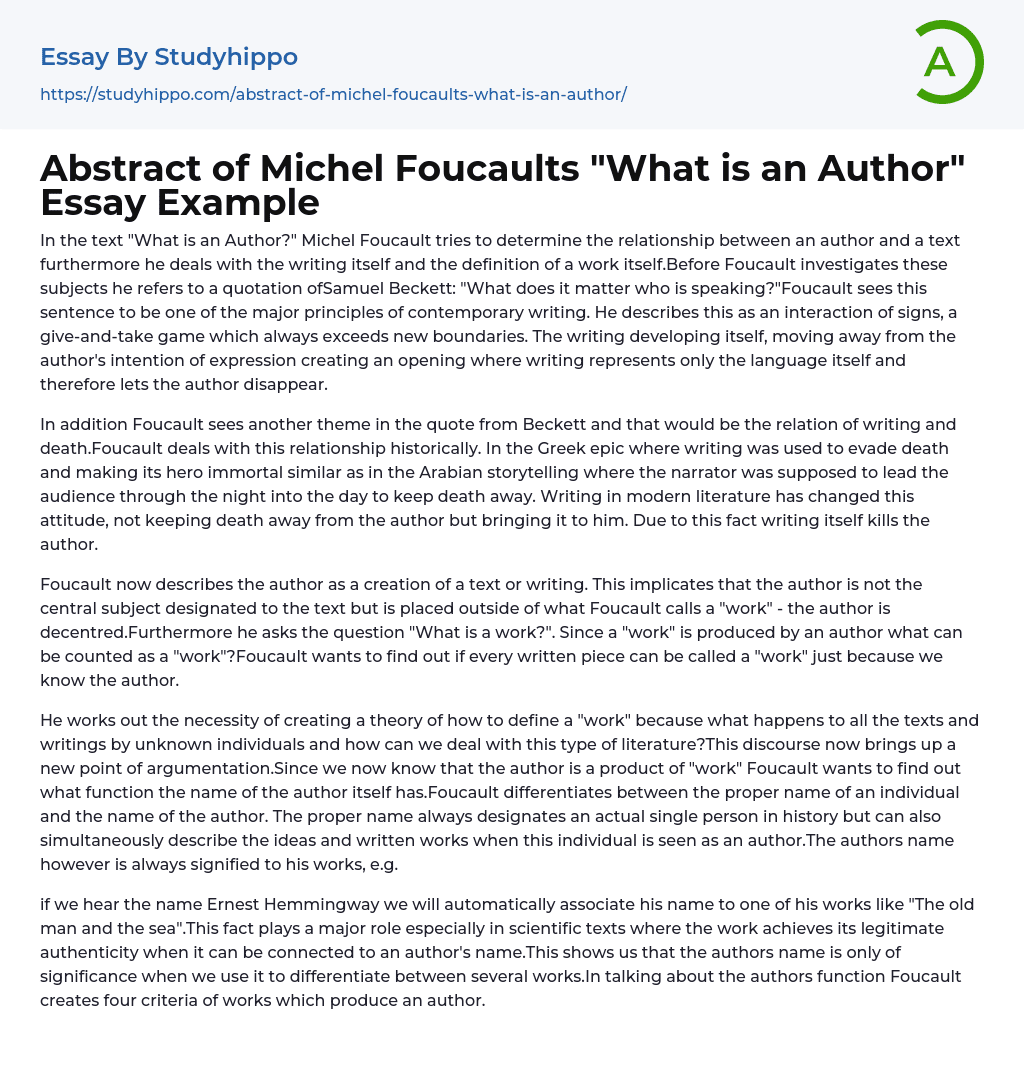

Abstract of Michel Foucaults “What is an Author” Essay Example
In the text "What is an Author?" Michel Foucault tries to determine the relationship between an author and a text furthermore he deals with the writing itself and the definition of a work itself.Before Foucault investigates these subjects he refers to a quotation ofSamuel Beckett: "What does it matter who is speaking?"Foucault sees this sentence to be one of the major principles of contemporary writing. He describes this as an interaction of signs, a give-and-take game which always exceeds new boundaries. The writing developing itself, moving away from the author's intention of expression creating an opening where writing represents only the language itself and therefore lets the author disappear.
In addition Foucault sees another theme in the quote from Beckett and that would be the relation of writing and death.Foucault d
...eals with this relationship historically. In the Greek epic where writing was used to evade death and making its hero immortal similar as in the Arabian storytelling where the narrator was supposed to lead the audience through the night into the day to keep death away. Writing in modern literature has changed this attitude, not keeping death away from the author but bringing it to him. Due to this fact writing itself kills the author.
Foucault now describes the author as a creation of a text or writing. This implicates that the author is not the central subject designated to the text but is placed outside of what Foucault calls a "work" - the author is decentred.Furthermore he asks the question "What is a work?". Since a "work" is produced by an author what can be counted as a "work"?Foucault wants to find out if every written
piece can be called a "work" just because we know the author.
He works out the necessity of creating a theory of how to define a "work" because what happens to all the texts and writings by unknown individuals and how can we deal with this type of literature?This discourse now brings up a new point of argumentation.Since we now know that the author is a product of "work" Foucault wants to find out what function the name of the author itself has.Foucault differentiates between the proper name of an individual and the name of the author. The proper name always designates an actual single person in history but can also simultaneously describe the ideas and written works when this individual is seen as an author.The authors name however is always signified to his works, e.g.
if we hear the name Ernest Hemmingway we will automatically associate his name to one of his works like "The old man and the sea".This fact plays a major role especially in scientific texts where the work achieves its legitimate authenticity when it can be connected to an author's name.This shows us that the authors name is only of significance when we use it to differentiate between several works.In talking about the authors function Foucault creates four criteria of works which produce an author.
1. The possession of a text or work. Seen historically books or speeches were only connected to the author if he made statements that were forbidden and therefore broke with certain rules or laws. This changed in the course of time with the idea of copyright rules in the nineteenth century giving the author a legitimate
ownership of his works.2.
The "author function". This function is quite variable since not every text necessarily needs an author like fairy tales or legends which get passed on from generation to generation. Whereas scientific texts need to be connected to an author to be legitimated and credible as already spoken of before. In fiction however we use the "author function" to determine the importance of a work in connection with the author's name.3.
The "author function" through the cause of time defined by the reader of the works. The reader changes his approach to interpretation of literature and therefore also the author in looking at the importance of his works from a different point of view.4. The importance of the "author function" in connection with his opinion in his works.Foucault shows the difference of an author's actual ideology and that of the narrator in of his texts.
Especially in fictional texts we have to separate the author's point of view to that of the narrator and find out how they close are to each other in order to make an objective interpretation.Foucault enables us through his discourse to make wider and more intense approaches to text analysis and showing us that there are still more possibilities in giving us more questions for further discourse.
- Age Of Enlightenment essays
- Ethos essays
- Time essays
- Acceptance essays
- Meaning Of Life essays
- Reality essays
- Natural Law essays
- Political Philosophy essays
- Utilitarianism essays
- Existence essays
- Free Will essays
- Good And Evil essays
- Confucianism essays
- Relativism essays
- Conscience essays
- Environmentalism essays
- Empiricism essays
- Epistemology essays
- Ethics essays
- Existentialism essays
- Human Nature essays
- Individualism essays
- Metaphysics essays
- Philosophy Of Life essays
- Transcendentalism essays
- Truth essays
- Destiny essays
- Determinism essays
- Fate essays
- Functionalism essays
- Philosophers essays
- Pragmatism essays
- Future essays
- Child Observation essays
- Critical Reflection essays
- Teaching Philosophy essays
- Personal Philosophy essays
- Action Speak Louder Than Words essays
- Can Money Buy Happiness essays
- Values of Life essays
- Ethical dilemma essays
- Normative Ethics essays
- Virtue Ethics essays
- Belief essays
- Deontology essays
- Moral essays
- Virtue essays
- Work Ethic essays
- Henry David Thoreau essays
- Carl Jung essays



